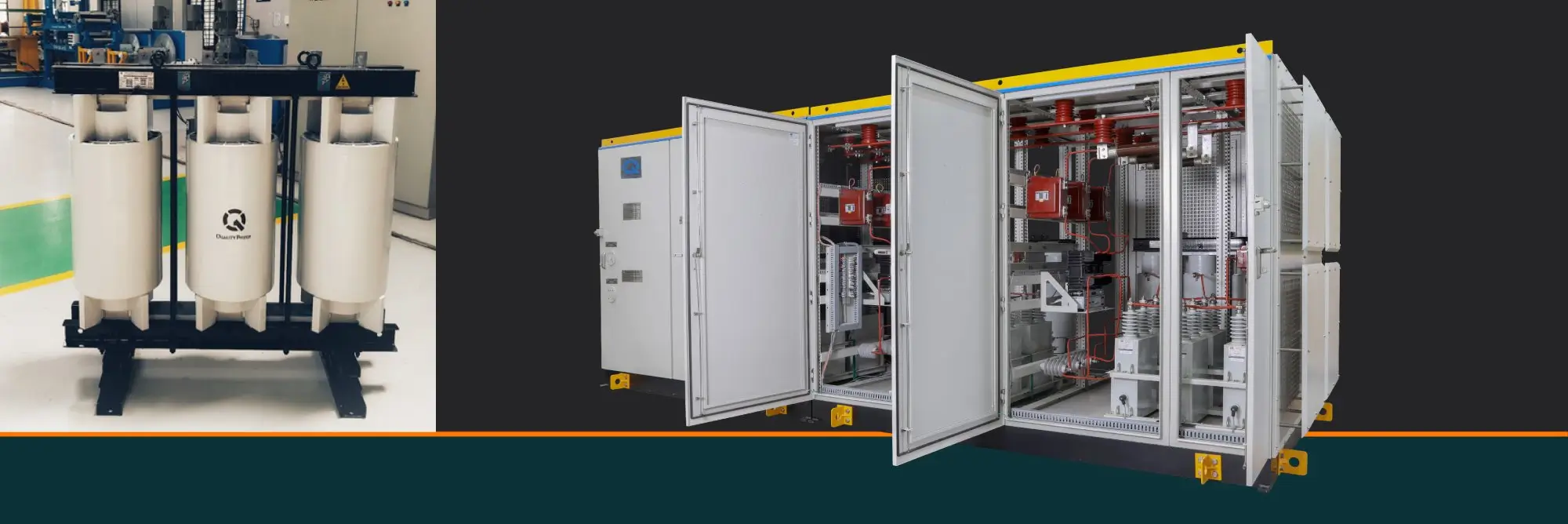
Reactors
Iron Core Reactor
Essential Components for Power Control and Stability
Iron Core Reactors, also known as iron core inductors, are vital components in electrical power systems, providing inductance to control current, manage reactive power, and filter harmonics. These reactors are built with a core made of laminated iron or steel, which significantly enhances their magnetic properties compared to air-core reactors. The iron core allows for a more compact design and higher inductance values, making Iron Core Reactors particularly suitable for applications that require precise control over high currents and voltages. They are commonly used in industrial, utility, and renewable energy applications, where reliable performance and robust construction are crucial.
Key Functions and Benefits
1 Current Limiting
Iron Core Reactors are often used as current-limiting devices in power systems, particularly during short-circuit conditions. By introducing inductance into the circuit, these reactors limit the rate at which current can rise, thereby protecting equipment from the damaging effects of overcurrent. This function is essential in high-power applications, such as in substations, where reactors help to prevent transformer saturation and protect circuit breakers, cables, and other critical infrastructure from excessive mechanical and thermal stress.
2 Reactive Power Compensation
In power systems, reactive power can cause inefficiencies and increase losses if not properly managed. Iron Core Reactors provide reactive power compensation by absorbing or generating reactive power as needed to maintain voltage levels and improve the power factor. This is particularly important in long transmission lines, renewable energy installations, and industrial processes with heavy inductive loads, where maintaining voltage stability and reducing losses are critical to efficient operation.
3 Harmonic Filtering
Iron Core Reactors are widely used in harmonic filtering applications, where they work in conjunction with capacitors to form harmonic filters. These filters are essential in mitigating the effects of harmonics generated by non-linear loads, such as variable frequency drives (VFDs), power converters, and large industrial machines. By filtering out these unwanted harmonic frequencies, Iron Core Reactors help improve power quality, reduce the risk of equipment malfunction, and ensure compliance with power quality standards.
4 Voltage Regulation
In power transmission and distribution networks, Iron Core Reactors help regulate voltage by controlling the flow of reactive power. They are often used in conjunction with capacitors in shunt or series configurations to stabilize voltage levels across the network, especially during load fluctuations or under light load conditions. This regulation ensures that voltage remains within acceptable limits, protecting equipment and enhancing the overall reliability of the power system.
5 Compact and Efficient Design
The iron core in these reactors allows for a more compact and efficient design compared to air-core reactors. The enhanced magnetic properties of the iron core enable higher inductance values with less material, resulting in reactors that are smaller, lighter, and more cost-effective while still delivering the necessary performance. This makes Iron Core Reactors an attractive option for applications where space is limited or where higher inductance is required in a compact form.
Applications
Iron Core Reactors are versatile and used in a wide range of applications, including:
- Power Transmission and Distribution: For voltage regulation, reactive power compensation, and current limiting in substations and high-voltage networks.
- Industrial Systems: In harmonic filtering and reactive power compensation for facilities with heavy inductive loads, such as steel mills, chemical plants, and manufacturing facilities.
- Renewable Energy: To stabilize and filter power in wind farms, solar power plants, and other renewable energy installations, ensuring grid compliance and reliable operation.
- Railway and Traction Systems: : In railway electrification systems, where they are used for filtering and reactive power management to ensure smooth operation and prevent voltage instability.
Customization and Engineering Expertise
Iron Core Reactors are often customized to meet the specific needs of different applications. This customization can involve adjustments to the core material, winding configuration, cooling method (air, oil, or water-cooled), and insulation type to match the operational demands and environmental conditions of the installation. Engineers work closely with clients to design reactors that provide optimal performance, durability, and efficiency in their intended use.
Iron Core Reactors are indispensable components in modern electrical systems, offering crucial support for current limiting, reactive power management, harmonic filtering, and voltage regulation. Their robust design, combined with the superior magnetic properties of the iron core, makes them well-suited to handle the demanding conditions of high-power applications. Whether used in power transmission, industrial processes, or renewable energy systems, Iron Core Reactors ensure the stability, efficiency, and reliability of electrical networks, making them a key component in achieving optimal power system performance.


